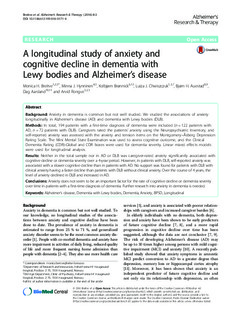| dc.contributor.author | Breitve, Monica H. | |
| dc.contributor.author | Hynninen, Minna J. | |
| dc.contributor.author | Brønnick, Kolbjørn | |
| dc.contributor.author | Chwiszczuk, Luiza J. | |
| dc.contributor.author | Auestad, Bjørn H. | |
| dc.contributor.author | Aarsland, Dag | |
| dc.contributor.author | Rongve, Arvid | |
| dc.date.accessioned | 2016-04-07T07:44:40Z | |
| dc.date.available | 2016-04-07T07:44:40Z | |
| dc.date.issued | 2016-01 | |
| dc.identifier.citation | Breitve, M.H et al. (2015) A longitudinal study of anxiety and cognitive decline in dementia with Lewy bodies and Alzheimer’s disease. Alzheimer's Research & Therapy, 8:3 | nb_NO |
| dc.identifier.uri | http://hdl.handle.net/11250/2384364 | |
| dc.description | This article was originally published in the journal "Alzheimer's Research & Therapy". This article is distributed under the terms of the Creative Commons Attribution 4.0 International License (http://creativecommons.org/licenses/by/4.0/), which permits unrestricted use, distribution, and reproduction in any medium, provided you give appropriate credit to the original author(s) and the source, provide a link to the Creative Commons license, and indicate if changes were made. | nb_NO |
| dc.description.abstract | Background
Anxiety in dementia is common but not well studied. We studied the associations of anxiety longitudinally in Alzheimer’s disease (AD) and dementia with Lewy bodies (DLB).
Methods
In total, 194 patients with a first-time diagnosis of dementia were included (n = 122 patients with AD, n = 72 patients with DLB). Caregivers rated the patients’ anxiety using the Neuropsychiatric Inventory, and self-reported anxiety was assessed with the anxiety and tension items on the Montgomery–Åsberg Depression Rating Scale. The Mini Mental State Examination was used to assess cognitive outcome, and the Clinical Dementia Rating (CDR)-Global and CDR boxes were used for dementia severity. Linear mixed effects models were used for longitudinal analysis.
Results
Neither in the total sample nor in AD or DLB was caregiver-rated anxiety significantly associated with cognitive decline or dementia severity over a 4-year period. However, in patients with DLB, self-reported anxiety was associated with a slower cognitive decline than in patients with AD. No support was found for patients with DLB with clinical anxiety having a faster decline than patients with DLB without clinical anxiety. Over the course of 4 years, the level of anxiety declined in DLB and increased in AD.
Conclusions
Anxiety does not seem to be an important factor for the rate of cognitive decline or dementia severity over time in patients with a first-time diagnosis of dementia. Further research into anxiety in dementia is needed. | nb_NO |
| dc.language.iso | eng | nb_NO |
| dc.publisher | BioMed Central | nb_NO |
| dc.rights | Navngivelse 3.0 Norge | * |
| dc.rights.uri | http://creativecommons.org/licenses/by/3.0/no/ | * |
| dc.subject | Alzheimers sykdom | nb_NO |
| dc.subject | Alzheimer's | nb_NO |
| dc.subject | dementia with Lewy bodies | nb_NO |
| dc.subject | demens | nb_NO |
| dc.subject | dementia | nb_NO |
| dc.subject | anxiety | nb_NO |
| dc.subject | BPSD | nb_NO |
| dc.subject | longitudinal | nb_NO |
| dc.subject | demens med Lewy-legemer | |
| dc.title | A longitudinal study of anxiety and cognitive decline in dementia with Lewy bodies and Alzheimer’ s disease | nb_NO |
| dc.type | Journal article | nb_NO |
| dc.type | Peer reviewed | nb_NO |
| dc.rights.holder | © 2016 Breitve et al. | nb_NO |
| dc.subject.nsi | VDP::Medical disciplines: 700::Clinical medical disciplines: 750 | nb_NO |
| dc.source.volume | 8 | nb_NO |
| dc.source.journal | Alzheimer's Research & Therapy | nb_NO |
| dc.identifier.doi | 10.1186/s13195-016-0171-4 | |

